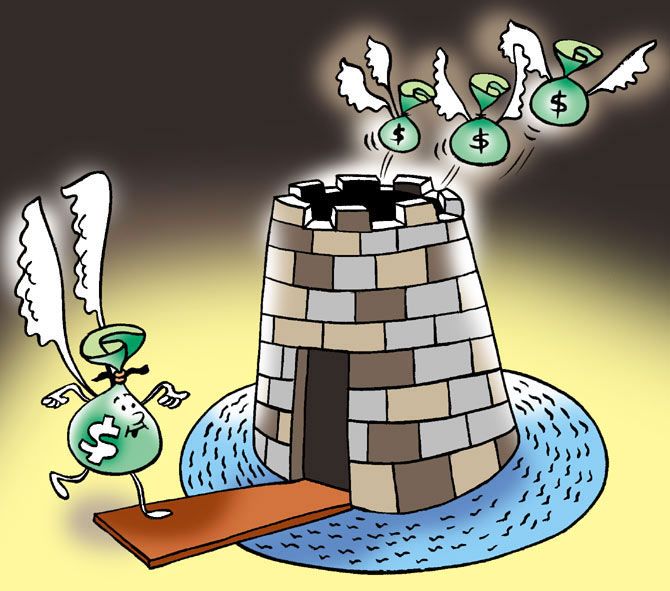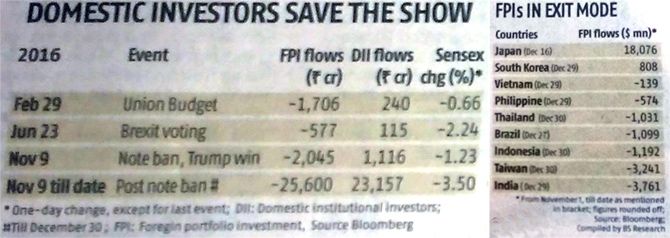 | « Back to article | Print this article |
A lot hinges on domestic investors for Indian equities to hold up, reports Hamsini Karthik.
Illustration: Uttam Ghosh/Rediff.com

What gathered momentum through the course of the year lost steam as two critical events -- Donald Trump winning the US presidential election and demonetisation -- played out in November. Foreign institutional investors (FIIs), which were largely buyers of Indian equities, started reducing their exposure to India significantly.
While this strategy is in tandem with their approach on emerging markets (EMs), India has seen a higher share of selling pressure, particularly since November 8, partly because it has also been among the favourites of foreign investors.
Possibility of three interest rate hikes by the US Fed (versus two hikes expected earlier), policy action of Trump which would be clearer by early 2017 and the shrinking interest rate parity between EMs and the US, could lead to more money flowing out of India and other EMs into the US.
In this context, experts believe Indian equities should brace for yet another year of tepid foreign fund inflow in 2017.
"Whether EMs will continue to get inflows from foreign funds will determine what will happen in India. The policy outlook by the US president-elect will be critical in determining how much of reallocation of portfolio will happen for the foreign portfolio investors (FPIs)," says Gautam Chhaochharia, executive director (ED) and head, India Research, UBS India.
Pramod Gubbi, head of equities of Ambit Capital, adds, "Given the commentary from the Republican Party, an anti-imports approach means money will not flow out of the US. So, a lot would depend on whether the fiscal stimulus in Japan and Europe to determine EM and India fund flow."
Domestic data points, too, are not encouraging
The expectations of earnings recovery in the second half of 2016-17, aided by good monsoon and festive demand have been dashed due to the note ban. A demand uptick in early 2017-18 might also be in doubt.
Sanjeev Prasad, Senior ED and co-head of Kotak Institutional Equities, and his team of analysts say, "There is disenchantment among foreign investors due to growing concerns about earnings downgrades and possible deterioration in macros for likely lower GDP growth and higher current account deficit."
With these headwinds, Chhaochharia says even if India enjoys inflows, it is unlikely that foreign portfolio investors (FPIs) might increase their India allocation, given the overweight status for most FPIs.
Who will rescue the market in 2017?
For now, the unanimous answer is domestic institutional investors (DIIs).
Faith in DIIs stems from the resilience they displayed on three important trading sessions (see table). Even from November 8 till date, when FPIs have withdrawn Rs 25,600 crore, DIIs have bought Rs 23,157 crore of equities.

Anand Radhakrishnan, chief investment officer (equity), Franklin Templeton Investments India, believes domestic flows can surprise positively in 2017 as well.
"As more money moves out of physical assets into financial assets, it would augment DII inflows," he states. The note ban is expected to curb unaccounted cash often used to buy real estate and bullion.
Higher share of Employee Provident Fund Organisation (EPFO) funds also lends important support to DII inflows. With interest rates on the decline, debt too is becoming less attractive.
A word of caution
While I expect a good amount of flows through MFs, it's a bit too soon to believe incremental savings could flow through financial products," Gubbi alerts.
In addition, Radhakrisnan warns that if there is sustained FPI selling, headwinds for Indian equities could be unavoidable, irrespective of DIIs' support. Experts are also cognizant of possible redemption pressures if 2017 turns out to be another year of low returns and high volatility.
"Return from savings has scaled down across all asset classes, and if equities returns remain dull in 2017, it could also trigger selling pressure for MFs," cautions a domestic fund manager. But, Gubbi believes SIPs, might help counter the redemption pressure. The expectation from domestic investors is quite high, and their support will be critical in 2017.
For their faith to continue will depend on the steps the government takes, including in the Union Budget scheduled for February 1, 2017 (which will include the Railways Budget for the first time), to boost growth and consumption which will be necessary to boost India Inc's earnings.